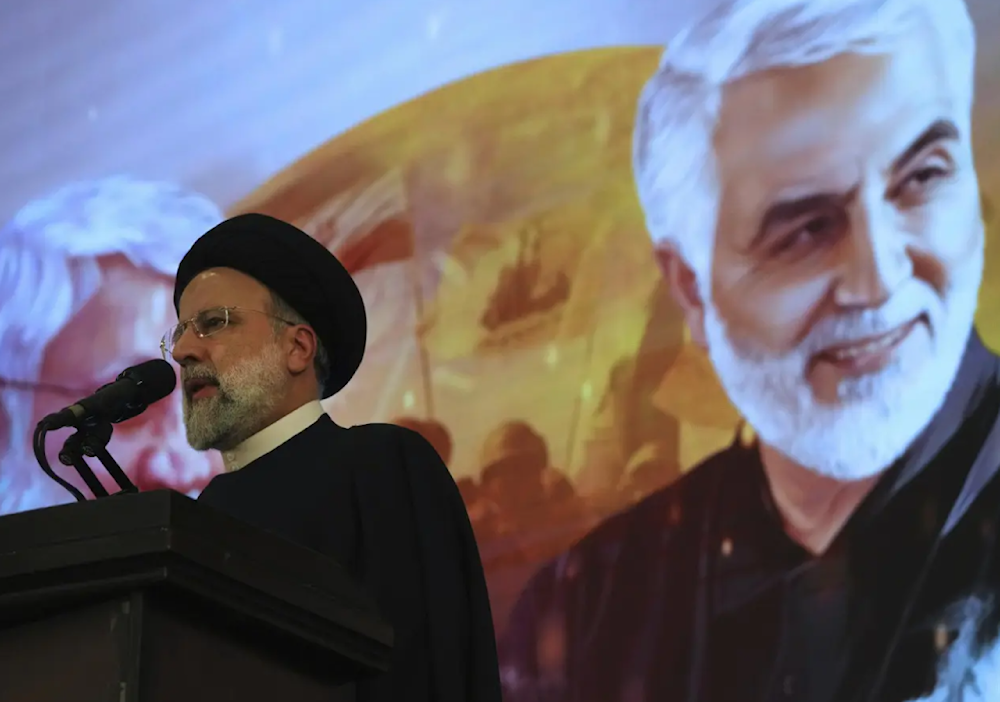Iran sends 2nd notice to US over General Soleimani assassination
The notification requesting arbitration was drafted in accordance with the Protection of Diplomats Convention.
-

Iranian President Ebrahim Raisi addresses a ceremony marking the anniversary of the death of General Qassem Soleimani on January 3, 2023. (AP)
The Iranian Foreign Ministry has issued a second official notification to the US administration, demanding arbitration over the killing of Iran's top anti-terror commander, Lieutenant General Qassem Soleimani in 2020.
Tavakkol Habibzadeh, the head of the Iranian President's Legal and International Affairs Center, made the revelation on Monday, stating that the second notice was composed and delivered after the US failed to react to the previous one on conducting talks, according to Press TV.
Last month, an Iranian court ordered the US government and other individuals and entities to pay a total of $49.77 billion in damages to claimants in a case related to the assassination of Lieutenant General Qassem Soleimani by the US in January 2020.
The notification requesting arbitration was drafted in accordance with the Protection of Diplomats Convention, a 1973 United Nations anti-terrorism pact aimed at preventing and punishing crimes against internationally protected individuals, including diplomatic agents.
According to Article 13 of the convention, the first notice seeking negotiation is delivered to the opposing party, and if it does not answer, the second letter requesting arbitration is issued.
If the US does not respond within 6 months, the third step is to refer the dispute to the International Court of Justice, Habibzadeh explained.
The US administration has until the end of April to react to the first arbitration demand issued a month and a half ago.
Earlier, Iran officially issued indictments for 73 US citizens over their involvement in the assassination of the former commander of Iran's Islamic Revolution Guard Corps' al-Quds Force Lieutenant General Soleimani, Iranian Judiciary Mohammad Mosaddeq announced on September 27.
Mosaddeq added that the judiciary had identified 97 implicated individuals, noting that Iran is looking to bring to trial former US President Donald Trump for his part in the assassination of the Resistance leader.
Operation Retaliation
On January 3, 2020, the US carried out a drone strike authorized by former US President Donald Trump targeting a car transporting the commander of al-Quds Force of the IRGC General Qassem Soleimani and his Iraqi trench-mate and the second-in-command of Iraqi Popular Mobilization Units (PMU), Abu Mahdi al-Muhandis.
The assassination led to an escalation of tensions between the United States and Iran, which pledged to avenge the martyrs. Martyr Soleimani was on an official visit to Iraq and was in a car with Martyr al-Muhandis at Baghdad's International Airport when they were assassinated by the US shortly after his arrival.
Days after his martyrdom, the anti-terror icon’s body was transferred to Iran and was laid to rest in his hometown of Kerman.
In retaliation, Tehran launched missiles at the Ain al-Assad base in Baghdad, one of the largest US bases in Iraq.
Iran in January identified 125 suspects and defendants in the assassination, explaining that "in addition to these suspects, there were other countries that had a role in the process."
"General Soleimani was not only a hero in the fight against terrorism and a security builder in the region but also a general and architect of peace, reconciliation, and brotherhood between Islamic nations," Iranian Foreign Ministry Spokesperson Nasser Kanaani said.

 3 Min Read
3 Min Read










